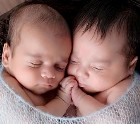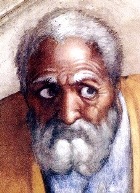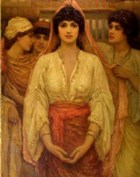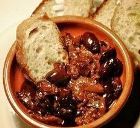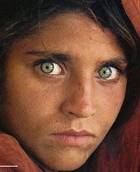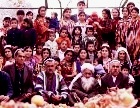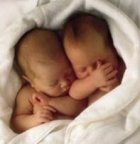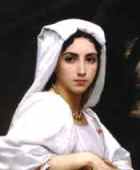Rebecca & Isaac
Paintings of their love story
Rebecca at the well
‘Eliezer and Rebecca at the Well’,
Nicolas Poussin, 1648
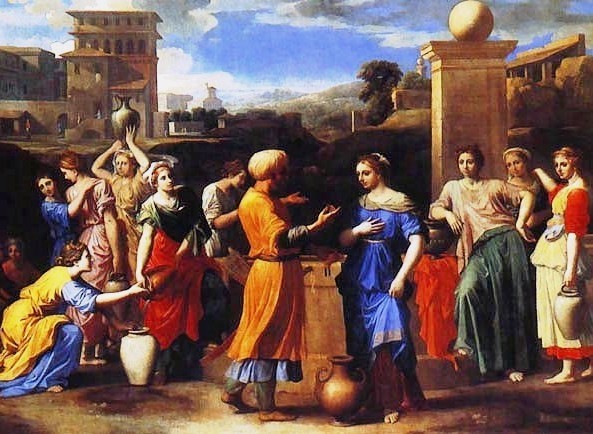
A surprised Rebecca listens as Abraham’s servant makes his proposal.
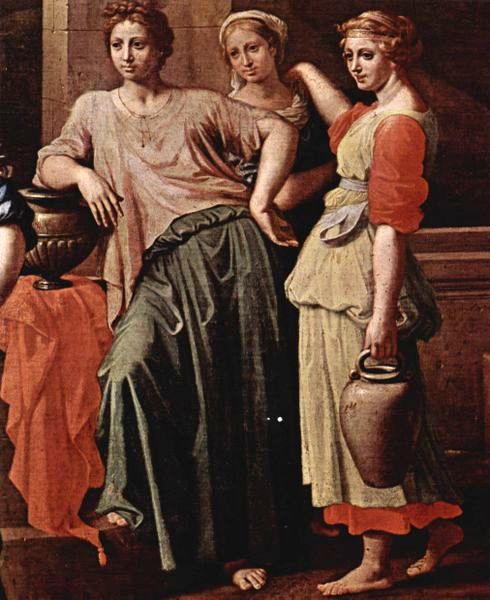
This painting was done when Poussin was at his peak. Unhappy and dissatisfied in his personal life, Poussin nevertheless painted with glorious elegance.
As you can see, history meant nothing to him: he dressed the women as if they were goddesses living in the Classical Age.
But what balance, what perfection in this painting. Each arm, each robe, each face is positioned so that it forms an harmonious whole.
And each figure has a distinctive personality. See the skepticism of the beautiful but rather tough-looking young woman in the green skirt, or the girls on the left giggling at the unexpected proposal Rebecca is receiving.
As you can guess, Poussin was influenced by Greek and Roman statuary. Like the great sculptors of the past he formed an ideal of beauty. His figures are posed in natural attitidues, and the clothing both conceals and enhances – as clothing should.
Poussin’s patron was the great Cardinal Barbarini, a generous sponsor. Then in 1640 Poussin was invited to Paris to become the young Louis XIV’s official painter – a great honour. But after three years in the French court Poussin gladly returned to Rome, where he died in 1665.
Bible reference: Genesis 24:1-27
‘Rebecca and Eliezer at the Well’,
Carlo Maratti, 1655-7
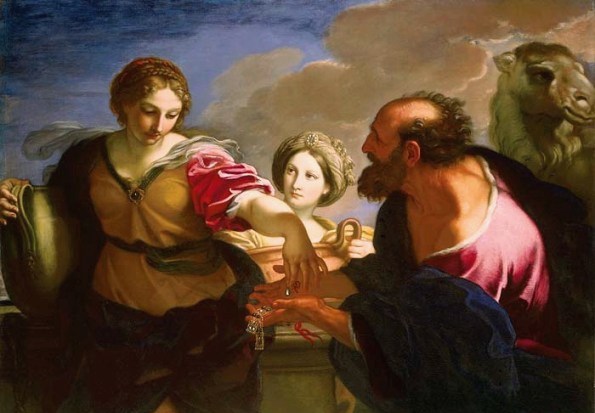
The jewels are offered to Rebecca, and her graceful hand reaches forward to take them.
Maratti was one of the last great masters of Baroque classicism, and the word that comes to mind to describe his paintings is ‘magnificence’.
He was also a great painter of the Virgin Mother – his nickname, Carluccio delle Madonne, means ‘Little Carlo of the Madonnas’.
The women in his paintings are splendid, serene, classically beautiful. The skin tones of the women in this painting of Rebecca and Eliezer, and their languid beauty, seem almost unearthly.
Bible reference: Genesis 24:1-27
‘Rebecca and Eliezer’ and
‘Rebecca at the Well’
Paolo Cagliari (Veronese), circa 1580
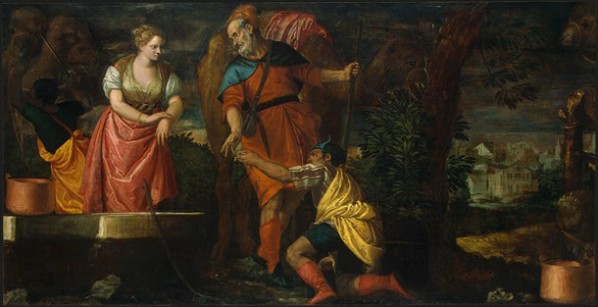
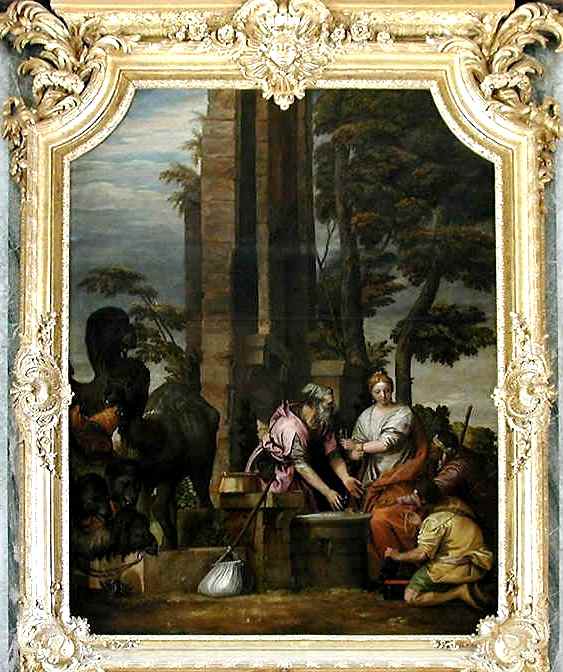
These paintings show the moment where Rebecca meets and impresses the strangers at the well. Her pose and ample figure suggest she has life and energy to offer an aspiring suitor.
In the first painting, a robust but dignified Rebecca listens intently to the words of the strangers at the well. She, and the men she is speaking to, are overshadowed by ruins of some long-lost, grandiose building. Only the well remains. It is the source of water and therefore of life and fertility – both of which Rebecca will offer to Isaac.
In the second painting, Cagiari-Veronese has reveled in the rich colors of the garments. They are vibrant, almost voluptuous. Again, the effect is of vigor, energy.
Veronese lacked imagination, but he made up for it with his genius for composition and sheer magnificence of color. He delighted in vast canvases, and was more skilled in composition than even Rubens.
Bible reference: Genesis 24:1-27
Title: ‘Rebekah at the Well’,
Michael Deas, 1997
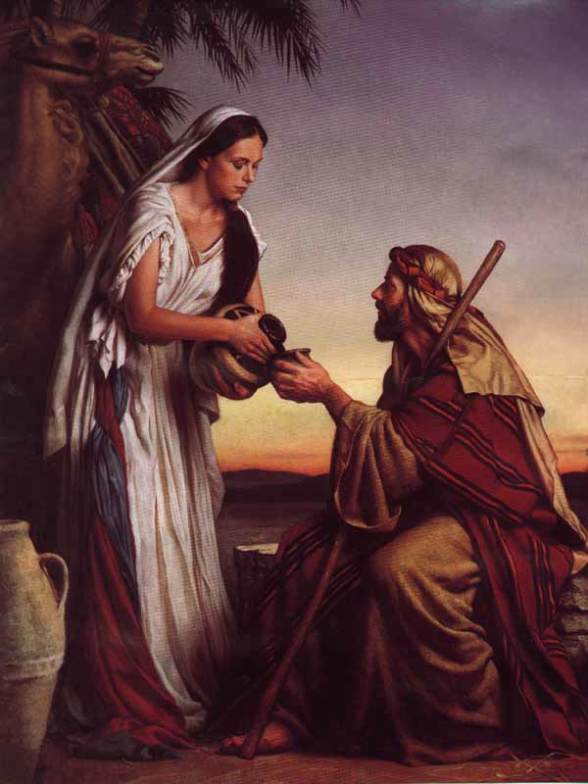
Rebecca pours precious water into the drinking cup of the traveler who has come from Abraham.
The painter of this well-known illustration of Rebecca was astonishingly versatile in his choice of subjects: Marilyn Munroe and James Dean on stamps in USA, and a Time Magazine cover of Ben Franklin, to name just two.
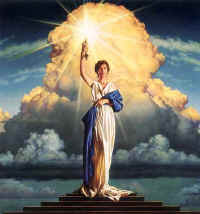 In this painting he has succeeded in presenting Rebekah as a strong, modern woman who, though modest, seems to be doling out the water on her own terms.
In this painting he has succeeded in presenting Rebekah as a strong, modern woman who, though modest, seems to be doling out the water on her own terms.
Bible reference: Genesis 24:1-27
Look at the thumbnail at right to see another inspiring woman painted by Michael Deas! Recognise her?
‘Rebecca at the Well’,
Chauncey B Ives, 1854
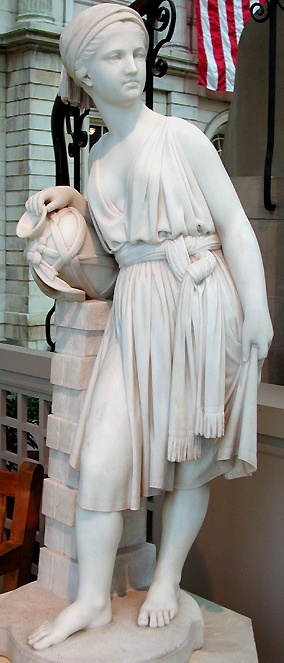
A very young Rebecca holds her water jug, ready to fill it. But something outside of her immediate area has distracted her, and she focuses on that.
Ives used graceful neo-classical marble statues to popularize sculpture in 19th century America. He was particularly skilled at capturing the vulnerability of women, as he does in this statue of Rebecca. She is so young, he seems to say, to be making a life-changing decision and setting out on a long journey to a strange land.
Not relevant? Yet this is what so many immigrants were doing in 19th century America – equally young, equally vulnerable.
Bible reference: Genesis 24:1-27
‘Story of Eliezer and Rebecca’,
Hans Jamnitzer, circa 1560-1568
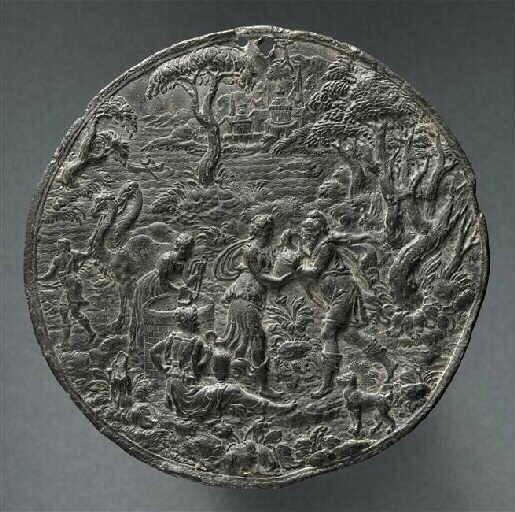
Eliezer was the head of Abraham’s household (see Genesis 15:2) and he was probably the leader of the expedition sent to find a bride for Isaac. Here he greets the young woman at the well.
Most images of Rebecca at the well focus on the human figures. This medal is bursting with abundant Nature – flourishing trees, bushes, grass and animals. Fertility.
Bible reference: Genesis 24:1-27
‘Eliezer and Rebecca’, Giambattista Pittoni
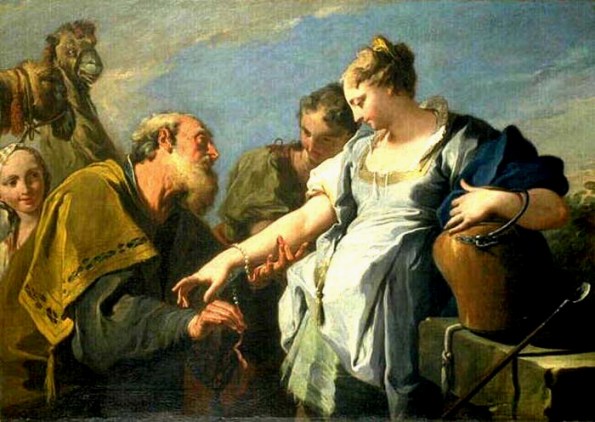
Eliezer the servant of Abraham offers Rebecca the jewels sent by his master for the future wife of Isaac.
This is an essential dilemma for women. Yes, the jewelry looks very pretty on her arm, but what price will she pay?
For Rebecca, it means leaving her home, enduring a difficult pregnancy, having a husband who does not always make wise choices, and being forced to choose between people she loves.
She ponders. Is it worth it?
Bible reference: Genesis 24:1-27
‘Rebecca and Eliezer’,
Bartolomé Esteban Perez Murillo
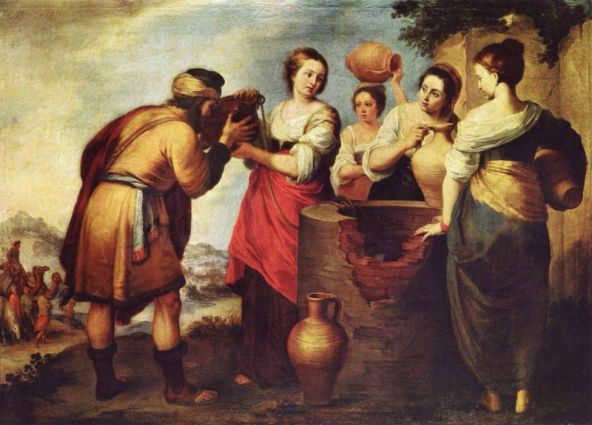
Rebecca offers water from the well to the traveler Eliezer, who is bringing her an offer of marriage.
Notice the side of the well. As with so many paintings of this scene, there is the suggestion of decay. Rebecca will do well to leave this land and seek out a new, more vigorous one.
Notice too the rounded shape of the water jars, and the rounded shapes of the young women. The underlying themes of water and fertility have been none-too-subtly suggested by Murillo.
Bible reference: Genesis 24:1-27
‘Rebecca at the Well’, Giandomenica Tiepolo
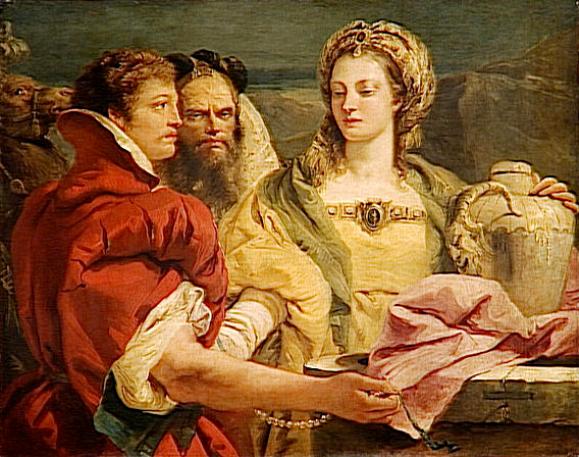
The servant of Abraham, sumptuously dressed, offers the jewels to Rebecca. These will be her gift if she consents to marry Isaac.
Tiepolo’s work was described as ‘full of spirit, of infinite fire, and dazzling color’. On the evidence of this painting alone, it seems to be true.
Yet there is an underlying melancholy in all his work. Look at Rebecca’s eyes. She sees the jewels being offered, but she also seems to see the years of sorrow she will endure as well – hers was not an easy life, either as a wife or as a mother.
Bible reference: Genesis 24:1-27
Rebecca, statue, Johannes Takanen, 1877
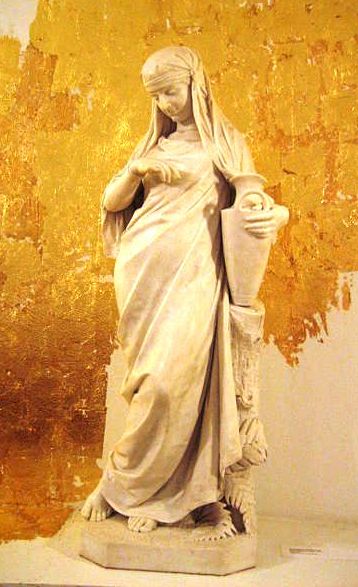
Rebecca stands, relaxed, at the well where she will meet the servant of Abraham.
Johannes Takanen was a Finnish sculptor of remarkable talent but limited means. He preferred to work in marble, but could only afford to do so four times during his lifetime.
The statue of Rebecca is one of these four. He has made her modest, good-humored and not in the least over-awed by the future that awaits her. You can’t help wishing he’d had more marble…
Bible reference: Genesis 24:1-27
‘Rebecca at the well’, unknown mosaic artist, 1132-1170
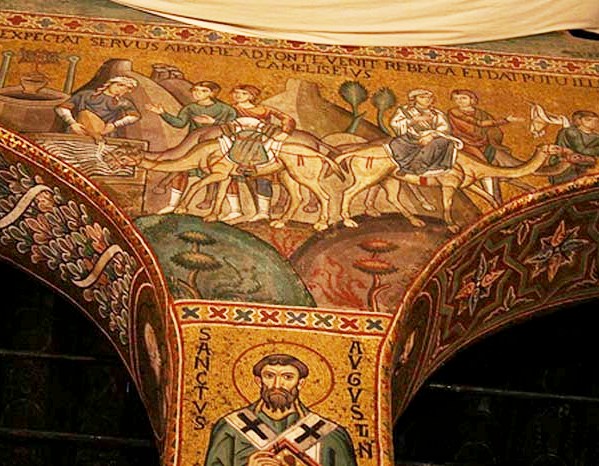
It was common at the time to show two events in the story rather than one, in the manner of a modern comic strip.
- The first shows Rebecca as she fills a jar full of water, to offer to the thirsty travelers.
- The second shows her mounted on a camel, on the long road she must take to meet her Isaac.
These mosaics are part of the glorious decoration of the Cappella Palatina in Palermo. This was a royal chapel, and no expense was spared. The shimmering gold of the mosaics gives the visitor the impression of being inside a jewel box.
The images themselves are as clear as when first produced, with loving attention to detail – see the happy smile on the camels’ faces as they lap at the gleaming water.
Bible reference: Genesis 24:1-27
Abraham’s Servant meets Rebecca at the Well, Rebecca’s journey to Isaac, unknown mosaic artist, circa 1180
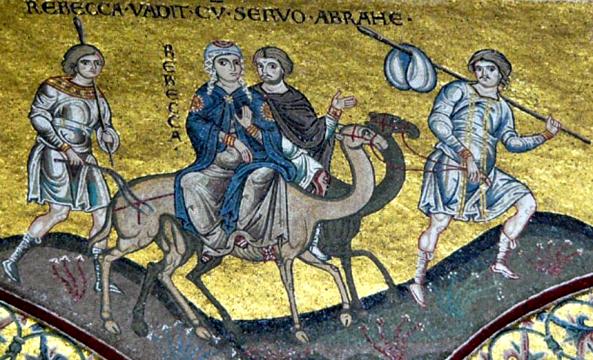
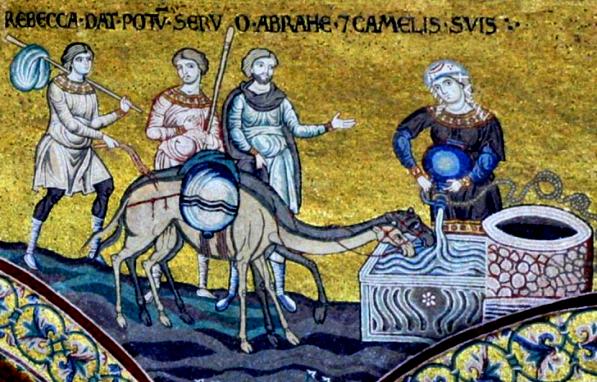
- In the first mosaic, Rebecca scoops water from the well for the thirsty travelers; the camel meanwhile helps itself.
- In the second mosaic, Rebecca, her nurse and her maids set out on the epic journey that will take them to Isaac, Rebecca’s husband-to-be.
Rebecca, mounted on a white camel, seems bemused by the decision she has made to leave everything familiar and set out for an unknown future.
These two mosaics are from the Norman cathedral at Monreale, Sicily – one of the most spectacular displays of mosaics anywhere in the world. The building was begun in 1174 by William II, who was determined to overshadow the Cappella Palatine in Palermo (see above.)
The mosaics were apparently completed within a space of 10 years, using Greek craftsmanship and designs with a strong Byzantine flavour.
Bible reference: (1) Genesis 24:1-27; (2) Genesis 24:61
‘Abraham’s Servant with Rebecca’
Jacob Hogers, 1616
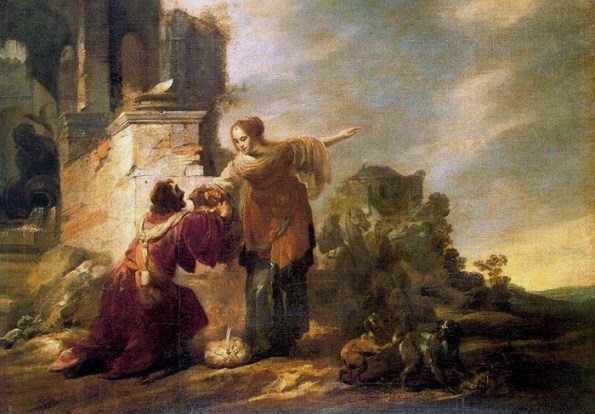
A sweet-faced Rebecca offers water to the thirsty servant of Abraham.
The background and gestures tell the story here. Rebecca stands among the ruins of a once-grand city, but her hand points to somewhere else – to the future?
The figure of Abraham’s servant strains forward, eager to convince her that she must leave this ruined place and come with him to meet her husband-to-be, Isaac.
Bible reference: Genesis 24:1-27
Isaac and Rebecca marry
Rebecca erblicht Isaac von ferne
(Rebecca sees Isaac in the distance)
Julius Schnorr von Carolsfeld, 1898
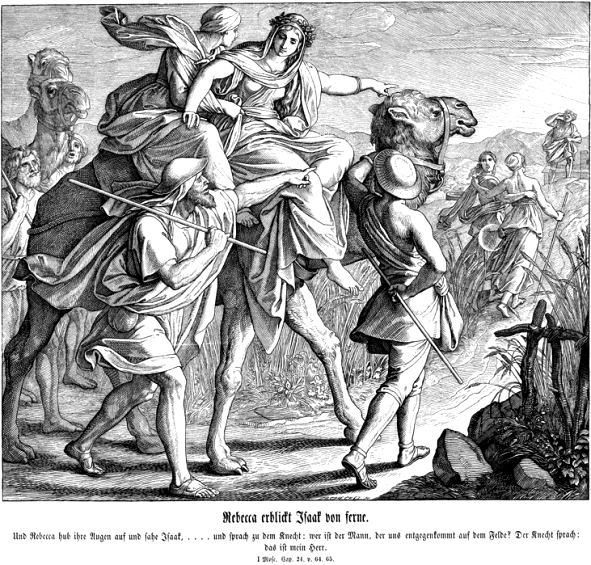
Woodcut from ‘The Bible in Pictures’. Rebecca, from a suitably commanding height, points the way to her new home, and to the waiting Isaac.
She is already in charge of the situation – indeed, as she will always be in the relationship with her husband Isaac. This is no shrinking violet…
‘Landscape with the Marriage of Isaac and Rebecca’
Claude Lorrain, 1648
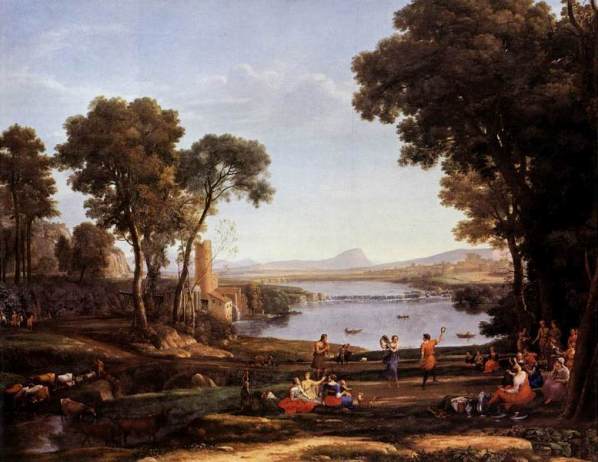
This idyllic scene is the setting for the marriage of Isaac and Rebecca.
Lorrain is best known for his idealized landscapes. This particular painting is characteristic of his work at this period:
- tall trees on one side of the picture balanced by a classical ruin and smaller trees further back;
- a foreground with figures;
- a winding river drawing the eye by stages through an open landscape to the horizon;
- and distant hills.
The whole is permeated with a clear, tranquil light. God’s blessing is on this scene.
Bible reference: Genesis 24:67
‘Isaac and Rebecca’ (The Jewish Bride), Rembrandt van Rijn, 1667
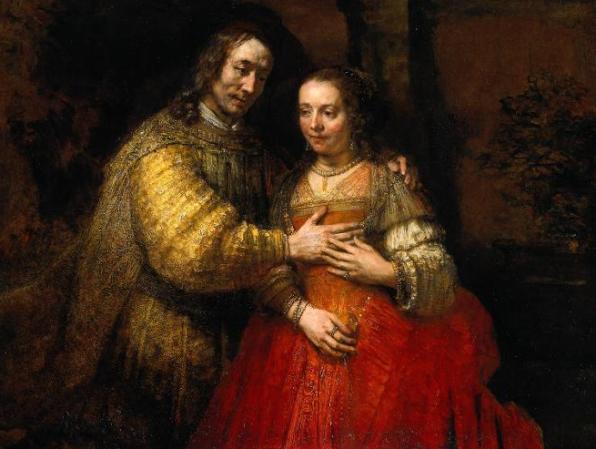
A magnificently dressed man and woman are in a shadowy room. The man has his arm around the woman’s shoulder and a hand on her breast. Very carefully she touches his hand with her fingertips.
His expression is tender, hers is tentative. What does it mean?
The identity of the two figures in this painting of Rembrandt’s is debated. The Rijksmuseum, where the painting is held, simply lists it as ‘Portrait of Two Figures from the Old Testament’.
Are they Isaac and Rebecca? ‘The Jewish Bride’ was painted by Rembrandt in 1667. It is one of the most famous and mysterious paintings in the museum’s collection.
The Birth of Jacob and Esau
‘God Spoke to Rebekah’, Deborah A Reeder, 2000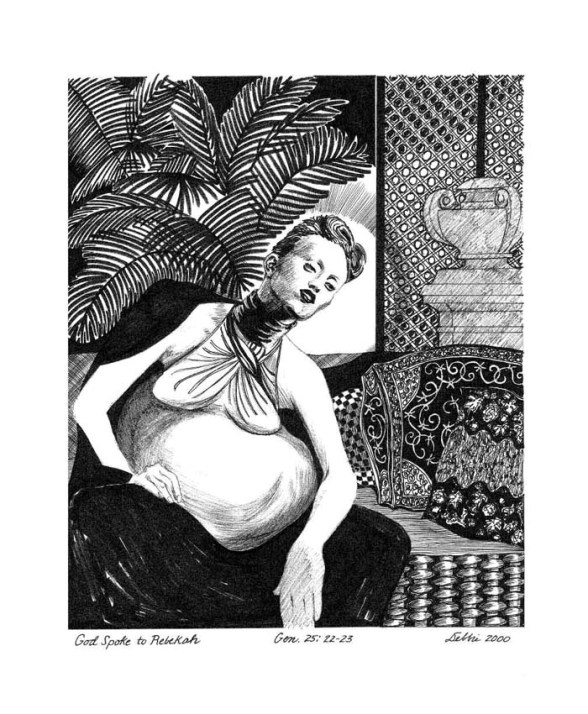
Rebekah bends under the weight of the twins within her womb.
Deborah Reeder’s wonderful drawings show the complexity of a woman’s life. Like Rebekah, she is treasured as she sets out on life’s journey. The way points ahead, but she has no way of knowing what the future will hold for her.
Then, when she loves and finds herself pregnant, a whole new world opens up. Heavy with the weight of her pregnancy, the woman is beautiful as she waits to give birth – to her children and to the future.
Bible reference: Genesis 24:1-27
Birth of Esau and Jacob. Paris circa 1360.
The illustrator of Jean de Mandeville’s “Travels” is unknown.
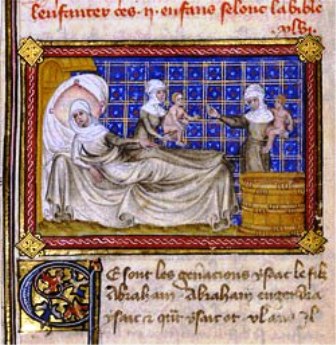
Rebecca’s difficult pregnancy has come to an end. She has given birth to not just one son, but two. She lies resting, and her maids take the newborn babies to be washed in a great tub of water.
The unknown illustrator of Mandeville’s book was both prolific and gifted. He worked in France from about 1350-70, for King John the Good and King Charles V.
His painting technique seems simple, but it isn’t. He painted the costumes and drapery of his figures with an underlay of gray or monochrome, which used properly gives a 3-dimensional effect.
Information about childbirth in biblical times at Bible Women: Major Events
Bible reference: Genesis 25: 24-26
Rebecca tricks Isaac
‘Isaac Blessing Jacob, ‘Govert Flinck, 1638
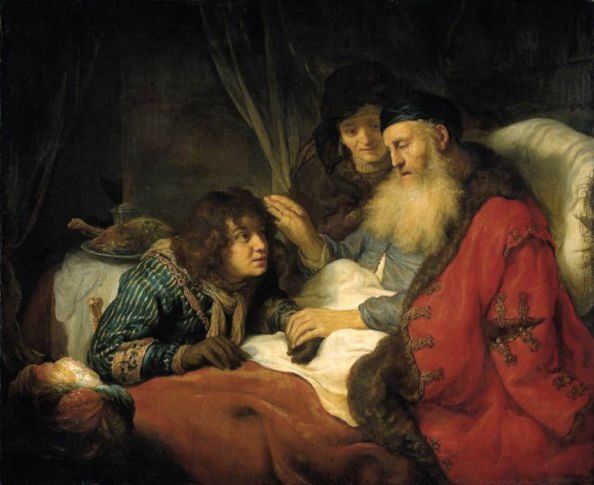
Old, blind, manipulated by those he thought he could trust. The luxurious coat, once a symbol of his authority in the tribe, now falls from his shoulders, reminding the viewer that his power now passes to the eager, duplicitous son kneeling at his bedside.
Flinck was a pupil of Rembrandt’s, and the influence of the older artist is clear in this painting of Rebecca and her husband and son.
She leans forward, urging her aged husband to give his blessing to the disguised Jacob.
The old man’s closed eyes remind us that he cannot see his son kneeling in front of him, and mistakenly thinks he is blessing his other son, the hirsute Esau.
Bible reference: Genesis 27
‘Rebecca Presents Jacob to Isaac’,
Nicolas-Guy Brenet, 1768
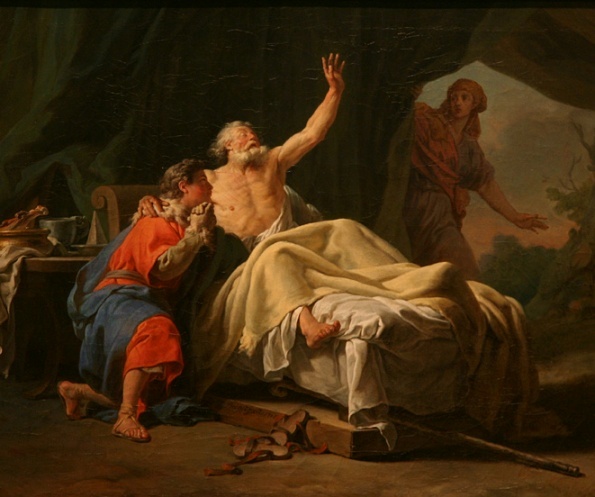
The skin of an animal is draped round Jacob’s neck and shoulders, to deceive his father. Rebecca watches silently as her plan unfolds.
Brenet has managed to capture the terrifying vulnerability of the blind. Isaac’s body is still strong and well-muscled but he, once so powerful, is now at the mercy of the people around him.
The anguish of his predicament shows clearly on his face.
Bible reference: Genesis 27
‘ Isaac Blessing Jacob’
Bartolomé Esteban Murillo, 1665-70
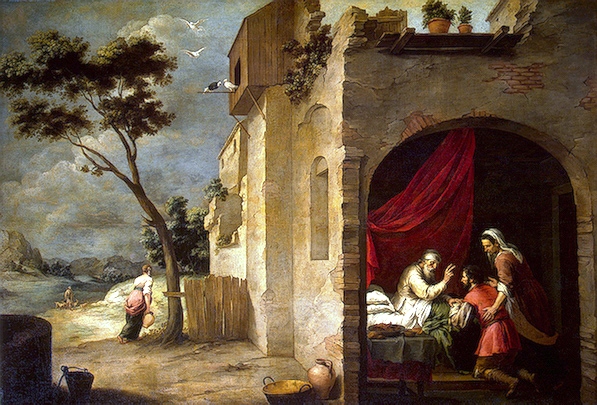
Jacob, prompted by Rebecca, has tricked his father into giving him the Blessing which will guarantee his future rule over the tribe.
What interesting composition in this painting. Every inch of it is drenched with significance. The left side is almost empty – certainly devoid of any significant activity. Why bother painting it at all? Despite the golden light that bathes the side of the house, there is a bleak quality to the space.
Contrast it with the right side of the painting: there is a great deal going on in this interior. The deceived, blind old man has been tricked into giving his blessing to Jacob, who kneels with his mother’s protective arm round his shoulder.
Here is human nature at its best and worst.
Bible reference: Genesis 27
‘The Gates of Paradise’ on the Baptistry in Florence
Rebecca gives birth to Isaac, Isaac sends his older son Esau for, Isaac mistakenly gives his blessing to Jacob. Ghiberti, 1404-24
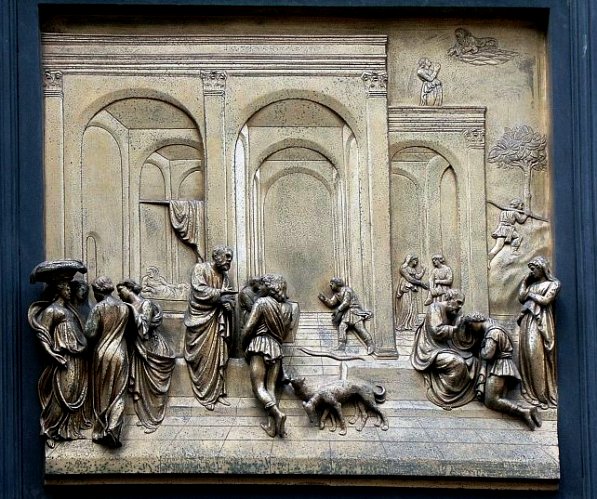
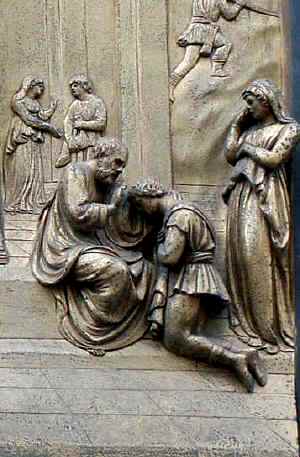
The whole story in a strip of key incidents:
- at left, the women gather to help Rebecca give birth;
- Isaac sends Esau on the hunt;
- Jacob receives Isaac’s blessing as Rebecca stands behind her son and watches.
This panel is always referred to as the ‘Isaac panel’, but if you look you will see that Ghiberti has framed the scenes on both sides with the figure of Rebecca. She may be the one who watches from the sidelines, but she dominates the events in this story.
The reliefs themselves are delicately classical – classical architecture, classical drapery and figures. But the realism of the poses shows the influence of Renaissance ideas about human beings – these are real people, with idiosyncratic gestures and movements.
See, for example, Rebecca’s ambivalent body language, as she watches her blind husband give his Blessing to the wrong son.
Bible reference: Genesis 24-28:5
‘Selling the Birthright’, Matthias Stomer, 1640
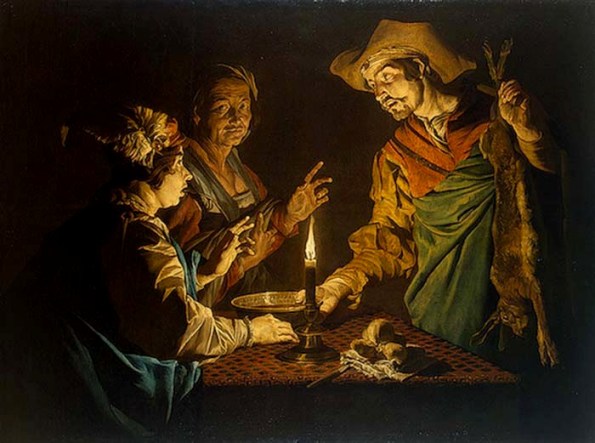
Esau comes in from hunting. He has been successful, but the hare he has caught will take a while to cook. Meanwhile, he is hungry, and asks Jacob for food. Jacob gives him some of the lentil stew he has been cooking, in return for the rights of inheritance that Esau has.
In contrast to some of the preceding paintings, these seem like real people in a real situation.
- Isaac looks doubtful – he does not like what he is doing.
- Rebecca has seen an opportunity to carry out a plan she has had for some time.
- Esau walks into her trap.
Bible reference: Genesis 25:29-34
‘Rebecca’, Hans Collaert, late 1500’s
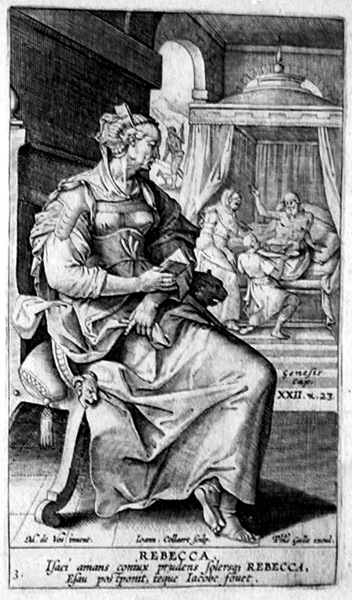
Rebecca sits thinking quietly, and behind her we see what she is thinking about….
This engraving, made in Antwerp, is a powerful representation of the characters involved in the story. Collaert has placed an aged Rebecca at the front of the image, as the dominating person in the story.
Behind her – as if she is imagining what will happen – or has it already happened? Isaac gives his blessing to Jacob.
Outside the doorway Esau tramps past with his hunting dog, fulfilling his father’s wish but losing the gift he most wants from his father – the all-important Blessing.
Bible reference: Genesis 27
SHE GAMBLED – AND WON!
Love at first sight
Rebecca was from a well-to-do family. She was also the niece of Abraham. One day when she took her flock to the well, she met some strangers. They had been sent by Abraham to find a wife for his son Isaac.
Rebecca impressed these strangers. They offered her valuable gifts, including a gold nose-ring and two gold bracelets, which she accepted. They turned out to be servants of her relative Abraham, so she offered them hospitality in her family’s home. Once there the strangers offered her a proposal of marriage. She and her family accepted it.
Leaving her home, she set out on a long journey – the husband-to-be whose name was Isaac was about nine hundred kilometers away from her home. When she met him, it was love at first sight for both of them. They married immediately.
But despite Isaac’s love for her, Rebecca did not conceive for some years. When she did become pregnant, she had a difficult time of it. Finally, Rebecca had twin sons.
From the start, the older son Esau was a ‘man’s man’, good at hunting and outdoors activities. Jacob, the younger twin, was quiet, more intelligent, depending on his wits rather than on brute strength.
One day, Esau casually gave his birthright to Jacob. This meant he handed over half of his inheritance,. It was probably done in jest, since their father would have to agree and Esau was confident this would never happen.
Time went by, and Isaac realized he was near death. This meant he would have to give his formal Blessing to the son he wanted to succeed him. Esau, his favorite son, was the obvious choice.
But Rebecca had other ideas. She believed that the quiet, intelligent Jacob would do a better job. So she colluded with her younger son and under her direction, Jacob tricked his blind, dying father into giving the Blessing to him.
Esau was enraged. He had been betrayed by his mother and brother and lost the inheritance that was due to him, his birthright and the Blessing. He planned to kill Jacob as soon as his father died. Once again, Rebecca stepped in to help Jacob escape. Before she died, this remarkable woman saw all her plans come to fruition.
An Extra Snippet
‘The drama of this episode (stealing the birthright) is among the most gripping in Genesis.
- Will Isaac dislodge Jacob’s disguise, as he blindly gropes over the goatskins draped round his neck?
- Will Esau arrive back from the hunt before Isaac has eaten the special stew and blessed Jacob?
We wait to discover whether Rebekah and Jacob will get away with their daring ruse. But as the narrator satisfies our love of the theatrical here, he outrages our moral and theological sense of propriety. How can he suggest that God’s intent to bless Jacob could, let alone should, be forwarded by such underhanded tactics?
Driver (p255) aptly sums up what seems to be the gist of the story as follows: it “tells how, instigated by his ambitious and designing mother, Jacob deceives his aged father, and wrests from his brother his father’s blessing. That the action of Rebekah and Jacob was utterly discreditable and indefensible, is of course obvious.” ‘ (Quoted from Word Biblical Commentary: Genesis 16-50, Gordon Wenham, p214)
Hidden meanings
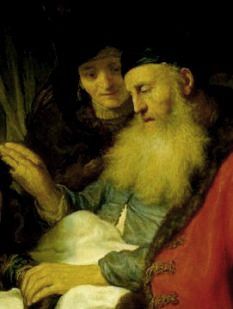
- This is a love story, but there is no happy-ever-after ending. This is life with all its ups and downs.
- Rebecca is often shown at a well. The well was an ancient symbol of woman and of her ability to give life. It held water needed for survival, and its shape was similar to the entrance of a vagina – keep in mind that the story-tellers of Genesis were tribal nomads who were a great deal more comfortable with their sexuality than modern readers are.
- An unbroken jar was a symbol of virginity.
- Christians saw the meeting of Eliezer and Rebecca as a prefiguration of the Annunciation, where the Angel Gabriel asks Mary to carry out an important part of God’s plan, and she accepts.
Read their story here
The Bible text
The Search for a Wife for Isaac, Genesis 24
1 Now Abraham was old, well advanced in years; and the Lord had blessed Abraham in all things.
2 Abraham said to his servant, the oldest of his house, who had charge of all that he had, ‘Put your hand under my thigh
3 and I will make you swear by the Lord, the God of heaven and earth, that you will not get a wife for my son from the daughters of the Canaanites, among whom I live,
4 but will go to my country and to my kindred and get a wife for my son Isaac.’
5 The servant said to him, ‘Perhaps the woman may not be willing to follow me to this land; must I then take your son back to the land from which you came?’
6 Abraham said to him, ‘See to it that you do not take my son back there.
7 The Lord, the God of heaven, who took me from my father’s house and from the land of my birth, and who spoke to me and swore to me, “To your offspring I will give this land”, he will send his angel before you; you shall take a wife for my son from there.
8 But if the woman is not willing to follow you, then you will be free from this oath of mine; only you must not take my son back there.’
9 So the servant put his hand under the thigh of Abraham his master and swore to him concerning this matter.
10 Then the servant took ten of his master’s camels and departed, taking all kinds of choice gifts from his master; and he set out and went to Aram-naharaim, to the city of Nahor.
11 He made the camels kneel down outside the city by the well of water; it was towards evening, the time when women go out to draw water.
12 And he said, ‘O Lord, God of my master Abraham, please grant me success today and show steadfast love to my master Abraham.
13 I am standing here by the spring of water, and the daughters of the townspeople are coming out to draw water.
14 Let the girl to whom I shall say, “Please offer your jar that I may drink”, and who shall say, “Drink, and I will water your camels”—let her be the one whom you have appointed for your servant Isaac. By this I shall know that you have shown steadfast love to my master.’
Rebekah at the Well
15 Before he had finished speaking, there was Rebekah, who was born to Bethuel son of Milcah, the wife of Nahor, Abraham’s brother, coming out with her water-jar on her shoulder.
16 The girl was very fair to look upon, a virgin whom no man had known. She went down to the spring, filled her jar, and came up.
17 Then the servant ran to meet her and said, ‘Please let me sip a little water from your jar.’
18 ‘Drink, my lord,’ she said, and quickly lowered her jar upon her hand and gave him a drink.
19 When she had finished giving him a drink, she said, ‘I will draw for your camels also, until they have finished drinking.’
20 So she quickly emptied her jar into the trough and ran again to the well to draw, and she drew for all his camels.
21 The man gazed at her in silence to learn whether or not the Lord had made his journey successful.
22 When the camels had finished drinking, the man took a gold nose-ring weighing a half-shekel, and two bracelets for her arms weighing ten gold shekels,
23 and said, ‘Tell me whose daughter you are. Is there room in your father’s house for us to spend the night?’
24 She said to him, ‘I am the daughter of Bethuel son of Milcah, whom she bore to Nahor.’
25 She added, ‘We have plenty of straw and fodder and a place to spend the night.’
26 The man bowed his head and worshipped the Lord
27 and said, ‘Blessed be the Lord, the God of my master Abraham, who has not forsaken his steadfast love and his faithfulness towards my master. As for me, the Lord has led me on the way to the house of my master’s kin.’
28 Then the girl ran and told her mother’s household about these things.
29 Rebekah had a brother whose name was Laban; and Laban ran out to the man, to the spring.
30 As soon as he had seen the nose-ring, and the bracelets on his sister’s arms, and when he heard the words of his sister Rebekah, ‘Thus the man spoke to me’, he went to the man; and there he was, standing by the camels at the spring.
31 He said, ‘Come in, O blessed of the Lord. Why do you stand outside when I have prepared the house and a place for the camels?’
32 So the man came into the house; and Laban unloaded the camels, and gave him straw and fodder for the camels, and water to wash his feet and the feet of the men who were with him.
Negotiations
33 Then food was set before him to eat; but he said, ‘I will not eat until I have told my errand.’ He said, ‘Speak on.’ 34 So he said ‘I am Abraham’s servant.
35 The Lord has greatly blessed my master, and he has become wealthy; he has given him flocks and herds, silver and gold, male and female slaves, camels and donkeys.
36 And Sarah my master’s wife bore a son to my master when she was old; and he has given him all that he has.
37 My master made me swear, saying, “You shall not take a wife for my son from the daughters of the Canaanites, in whose land I live;
38 but you shall go to my father’s house, to my kindred, and get a wife for my son.”
39 I said to my master, “Perhaps the woman will not follow me.”
40 But he said to me, “The Lord, before whom I walk, will send his angel with you and make your way successful. You shall get a wife for my son from my kindred, from my father’s house.
41 Then you will be free from my oath, when you come to my kindred; even if they will not give her to you, you will be free from my oath.”
42 ‘I came today to the spring, and said, “O Lord, the God of my master Abraham, if now you will only make successful the way I am going!
43 I am standing here by the spring of water; let the young woman who comes out to draw, to whom I shall say, ‘Please give me a little water from your jar to drink,’
44 and who will say to me, ‘Drink, and I will draw for your camels also’—let her be the woman whom the Lord has appointed for my master’s son.”
45 ‘Before I had finished speaking in my heart, there was Rebekah coming out with her water-jar on her shoulder; and she went down to the spring, and drew. I said to her, “Please let me drink.”
46 She quickly let down her jar from her shoulder, and said, “Drink, and I will also water your camels.” So I drank, and she also watered the camels.
47 Then I asked her, “Whose daughter are you?” She said, “The daughter of Bethuel, Nahor’s son, whom Milcah bore to him.” So I put the ring on her nose, and the bracelets on her arms.
48 Then I bowed my head and worshipped the Lord, and blessed the Lord, the God of my master Abraham, who had led me by the right way to obtain the daughter of my master’s kinsman for his son.
49 Now then, if you will deal loyally and truly with my master, tell me; and if not, tell me, so that I may turn either to the right hand or to the left.’
50 Then Laban and Bethuel answered, ‘The thing comes from the Lord; we cannot speak to you anything bad or good.
51 Look, Rebekah is before you; take her and go, and let her be the wife of your master’s son, as the Lord has spoken.’
52 When Abraham’s servant heard their words, he bowed himself to the ground before the Lord.
The Gifts
53 And the servant brought out jewellery of silver and of gold, and garments, and gave them to Rebekah; he also gave to her brother and to her mother costly ornaments.
54 Then he and the men who were with him ate and drank, and they spent the night there. When they rose in the morning, he said, ‘Send me back to my master.’
55 Her brother and her mother said, ‘Let the girl remain with us a while, at least ten days; after that she may go.’
56 But he said to them, ‘Do not delay me, since the Lord has made my journey successful; let me go, that I may go to my master.’
Rebekah Consents
57 They said, ‘We will call the girl, and ask her.’
58 And they called Rebekah, and said to her, ‘Will you go with this man?’ She said, ‘I will.’
59 So they sent away their sister Rebekah and her nurse along with Abraham’s servant and his men.
60 And they blessed Rebekah and said to her,
‘May you, our sister, become
thousands of myriads;
may your offspring gain possession
of the gates of their foes.’
61 Then Rebekah and her maids rose up, mounted the camels, and followed the man; thus the servant took Rebekah, and went his way.
62 Now Isaac had come from Beer-lahai-roi, and was settled in the Negeb.
Love At First Sight
63 Isaac went out in the evening to walk in the field; and looking up, he saw camels coming.
64 And Rebekah looked up, and when she saw Isaac, she slipped quickly from the camel,
65 and said to the servant, ‘Who is the man over there, walking in the field to meet us?’ The servant said, ‘It is my master.’ So she took her veil and covered herself.
66 And the servant told Isaac all the things that he had done.
67 Then Isaac brought her into his mother Sarah’s tent. He took Rebekah, and she became his wife; and he loved her. So Isaac was comforted after his mother’s death.
Rebecca’s Two Sons, Esau and Jacob, Genesis 25:19-34
19 These are the descendants of Isaac, Abraham’s son: Abraham was the father of Isaac,
20 and Isaac was forty years old when he married Rebekah, daughter of Bethuel the Aramean of Paddan-aram, sister of Laban the Aramean.
21 Isaac prayed to the Lord for his wife, because she was barren; and the Lord granted his prayer, and his wife Rebekah conceived.
22 The children struggled together within her; and she said, ‘If it is to be this way, why do I live?’ So she went to inquire of the Lord.
23 And the Lord said to her,
‘Two nations are in your womb,
and two peoples born of you shall be divided;
one shall be stronger than the other,
the elder shall serve the younger.’
24 When her time to give birth was at hand, there were twins in her womb.
25 The first came out red, all his body like a hairy mantle; so they named him Esau.
26 Afterwards his brother came out, with his hand gripping Esau’s heel; so he was named Jacob. Isaac was sixty years old when she bore them.
27 When the boys grew up, Esau was a skilful hunter, a man of the field, while Jacob was a quiet man, living in tents.
28 Isaac loved Esau, because he was fond of game; but Rebekah loved Jacob.
Jacob and Rebekah steal the Birthright
29 Once when Jacob was cooking a stew, Esau came in from the field, and he was famished.
30 Esau said to Jacob, ‘Let me eat some of that red stuff, for I am famished!’ (Therefore he was called Edom.)
31 Jacob said, ‘First sell me your birthright.’
32 Esau said, ‘I am about to die; of what use is a birthright to me?’ 33Jacob said, ‘Swear to me first.’ So he swore to him, and sold his birthright to Jacob.
34 Then Jacob gave Esau bread and lentil stew, and he ate and drank, and rose and went his way. Thus Esau despised his birthright.
Isaac Blesses Jacob, Genesis 27
1 When Isaac was old and his eyes were dim so that he could not see, he called his elder son Esau and said to him, ‘My son’; and he answered, ‘Here I am.’
2 He said, ‘See, I am old; I do not know the day of my death.
3 Now then, take your weapons, your quiver and your bow, and go out to the field, and hunt game for me.
4 Then prepare for me savoury food, such as I like, and bring it to me to eat, so that I may bless you before I die.’
Isaac Meets his Match
5 Now Rebekah was listening when Isaac spoke to his son Esau. So when Esau went to the field to hunt for game and bring it,
6 Rebekah said to her son Jacob, ‘I heard your father say to your brother Esau,
7 “Bring me game, and prepare for me savoury food to eat, that I may bless you before the Lord before I die.”
8 Now therefore, my son, obey my word as I command you.
9 Go to the flock, and get me two choice kids, so that I may prepare from them savory food for your father, such as he likes;
10 and you shall take it to your father to eat, so that he may bless you before he dies.’
11 But Jacob said to his mother Rebekah, ‘Look, my brother Esau is a hairy man, and I am a man of smooth skin.
12 Perhaps my father will feel me, and I shall seem to be mocking him, and bring a curse on myself and not a blessing.’
13 His mother said to him, ‘Let your curse be on me, my son; only obey my word, and go, get them for me.’
14 So he went and got them and brought them to his mother; and his mother prepared savoury food, such as his father loved.
The Deception
15 Then Rebekah took the best garments of her elder son Esau, which were with her in the house, and put them on her younger son Jacob;
16 and she put the skins of the kids on his hands and on the smooth part of his neck.
17 Then she handed the savoury food, and the bread that she had prepared, to her son Jacob.
18 So he went in to his father, and said, ‘My father’; and he said, ‘Here I am; who are you, my son?’
19 Jacob said to his father, ‘I am Esau your firstborn. I have done as you told me; now sit up and eat of my game, so that you may bless me.’
20 But Isaac said to his son, ‘How is it that you have found it so quickly, my son?’ He answered, ‘Because the Lord your God granted me success.’
21 Then Isaac said to Jacob, ‘Come near, that I may feel you, my son, to know whether you are really my son Esau or not.’
22 So Jacob went up to his father Isaac, who felt him and said, ‘The voice is Jacob’s voice, but the hands are the hands of Esau.’
23 He did not recognize him, because his hands were hairy like his brother Esau’s hands; so he blessed him.
24 He said, ‘Are you really my son Esau?’ He answered, ‘I am.’
25 Then he said, ‘Bring it to me, that I may eat of my son’s game and bless you.’ So he brought it to him, and he ate; and he brought him wine, and he drank.
26 Then his father Isaac said to him, ‘Come near and kiss me, my son.’
27 So he came near and kissed him; and he smelled the smell of his garments, and blessed him, and said,
‘Ah, the smell of my son
is like the smell of a field that the Lord has blessed.
The Blessing
28 May God give you of the dew of heaven,
and of the fatness of the earth,
and plenty of grain and wine.
29 Let peoples serve you,
and nations bow down to you.
Be lord over your brothers,
and may your mother’s sons bow down to you.
Cursed be everyone who curses you,
and blessed be everyone who blesses you!’
Esau’s Lost Blessing
30 As soon as Isaac had finished blessing Jacob, when Jacob had scarcely gone out from the presence of his father Isaac, his brother Esau came in from his hunting.
31 He also prepared savoury food, and brought it to his father. And he said to his father, ‘Let my father sit up and eat of his son’s game, so that you may bless me.’
32 His father Isaac said to him, ‘Who are you?’ He answered, ‘I am your firstborn son, Esau.’
33 Then Isaac trembled violently, and said, ‘Who was it then that hunted game and brought it to me, and I ate it all before you came, and I have blessed him?—yes, and blessed he shall be!’
34 When Esau heard his father’s words, he cried out with an exceedingly great and bitter cry, and said to his father, ‘Bless me, me also, father!’
35 But he said, ‘Your brother came deceitfully, and he has taken away your blessing.’
36 Esau said, ‘Is he not rightly named Jacob?* For he has supplanted me these two times. He took away my birthright; and look, now he has taken away my blessing.’ Then he said, ‘Have you not reserved a blessing for me?’
37 Isaac answered Esau, ‘I have already made him your lord, and I have given him all his brothers as servants, and with grain and wine I have sustained him. What then can I do for you, my son?’
38 Esau said to his father, ‘Have you only one blessing, father? Bless me, me also, father!’ And Esau lifted up his voice and wept.
39 Then his father Isaac answered him:
‘See, away from the fatness of the earth shall your home be,
and away from the dew of heaven on high.
40 By your sword you shall live,
and you shall serve your brother;
but when you break loose,
you shall break his yoke from your neck.’
Bible Art
Paintings and Artworks from the Old and New Testament
Isaac, Rebecca and their sons Jacob and Esau
Rebecca & Isaac links
Paintings by
‘Just give me the food’ he said. ‘What use is a birthright to me if I die of hunger?’ Jacob handed his brother the food, Esau ate, and the birthright was Jacob’s.
‘On one of these visits Jacob’s daughter Dinah was molested by the son of the local ruler, Shechem son of Hamor. Molested is too gentle a word. The young girl was raped. Strangely, Shechem seems to have fallen deeply in love with her…. ‘
‘If it seems strange to us that the choice of a husband was a matter for the whole family, we must remember the young woman was allying herself not only with her husband but with his whole family too. The couple did not form a nuclear family in the modern sense, for these were virtually unknown, but became part of a large group.’
‘When Mary of Nazareth (or Rebecca, wife of Isaac) went into labor in Nazareth, she was the center of a tight little band of kinswomen and villagers: a midwife, her relatives and her friends. She knew what to expect. She had seen many village women giving birth…’
‘From the start the older son Esau was a man’s man, good at hunting and outdoors activities. Jacob, the younger twin, was quiet, more intelligent, using his wits rather than brute strength.’
‘The girl was very fair to look upon, a virgin whom no man had known. She went down to the spring and filled her jar. The servant ran to meet her saying, ‘Please let me sip water from your jar.’ ‘Drink, my lord,’ she said.’
Read more…
© Copyright 2006
Elizabeth Fletcher


